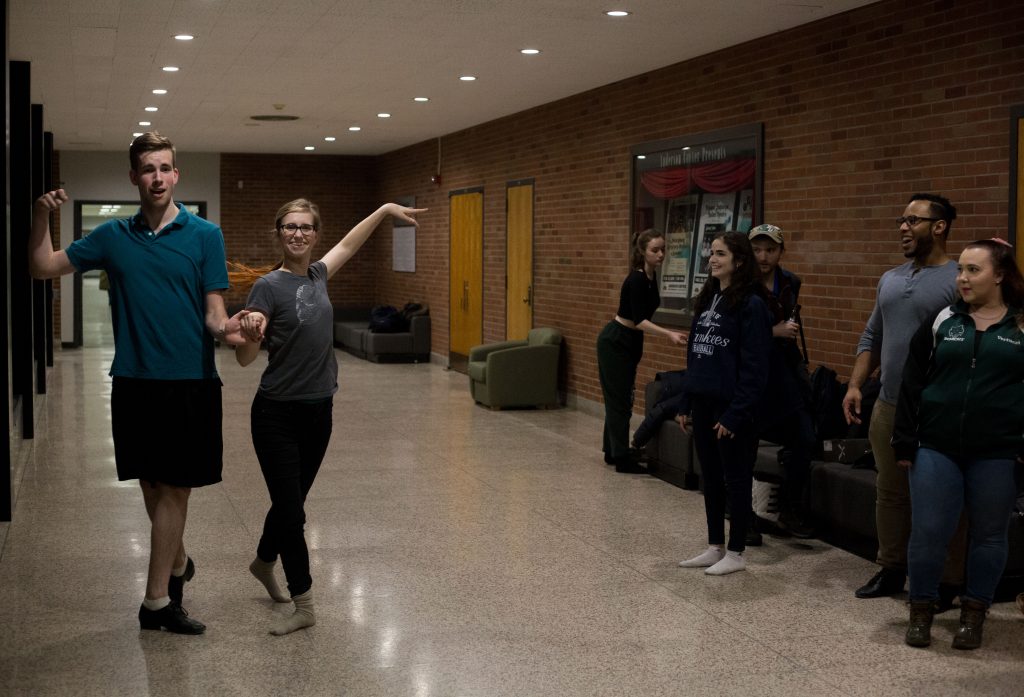
The Binghamton University campus is pretty quiet at 6 a.m., but on some Thursday mornings, sharp choreography and pop music fill a mirrored room in the Fine Arts Building as the Binghamton Kickline team rehearses their numbers.
“[6 a.m.] is usually the best time to get a dance room,” said Meghan Paola, a senior double-majoring in political science and history and the president of Binghamton Kickline. “There’s usually not other groups rehearsing, like the theatre department and [groups] like that.”
For some groups, it’s easier to request a time when the building is not yet open, rather than having to compete with the other groups attempting to get space.
The Fine Arts Building is home to three mirrored rooms and two large rehearsal spaces without mirrors, making only five spaces for theatre students, dance students, actors in Mainstage and studio productions and students in the over 20 Student Association-chartered dance and music performance organizations to practice. Many organizations are instead forced to use unconventional rehearsal spaces — such as hallways and corridors.
Victoria Velazquez, the president of Evolution Dance Company (EDC) and a senior majoring in biochemistry, explained that each EDC choreographer needs to go individually to the Theatre Collections Office in the Fine Arts Building to reserve a room to rehearse their dance. When Velazquez choreographed a dance last year, she said she followed the necessary steps and still experienced difficulties.
“I used to have my rehearsals last year on Monday nights at 8, and I would literally have to get there at 8 a.m., and there would already be a line of people outside Collections waiting to book a room,” Velazquez said.
EDC and other dance groups like Quimbamba Latin Dance Team and the Ballroom Dance Association often resort to rehearsing in inadequate locations.
“Our dancers are going to show up, whether we have a room or not,” Velazquez said.
Kari Bayait, the marketing and promotions manager for the BU theatre department, explained that the first priority of these spaces goes to credit-bearing theatre courses. This includes rehearsals for Mainstage productions, for which students earn academic credit. These reservations are separate from those of student groups — in other words, when Velazquez waits in line at 8 a.m., multiple rooms may already be reserved for theatre courses.
Madeline Mahon, member and former president of Rhythm Method and a senior double-majoring in English and philosophy, politics and law, said that the lack of mirrored rooms creates limited options for the multitude of groups in need of one.
“The one time I reserved I got there at 7 a.m. and there were multiple people already in line,” said Mahon, who is also the president of the A Cappella Council.
Mahon’s problems with reserving space for Rhythm Method have extended beyond just rehearsal time. In March 2017, one year before the group’s 25th anniversary show, she waited outside the Anderson Center office, which opens at 8 a.m., at 5:45 a.m. to reserve the Chamber Hall.
“A janitor literally had to let me in, and I was the second one in line,” she said. “It’s an absolutely crazy, competitive process.”
Bayait said that, eventually, this issue could be rectified by students bringing their opinions to offices such as the Dean of Students or Student Affairs. This way, Bayait said, the University might respond by adding more rehearsal space on campus.
“What we’re hoping that happens in the next couple of years is that enough student groups complain that there aren’t enough practice spaces for dance groups and mirrored rooms,” Bayait said. “Really, there just aren’t enough spaces to accommodate everybody.”


